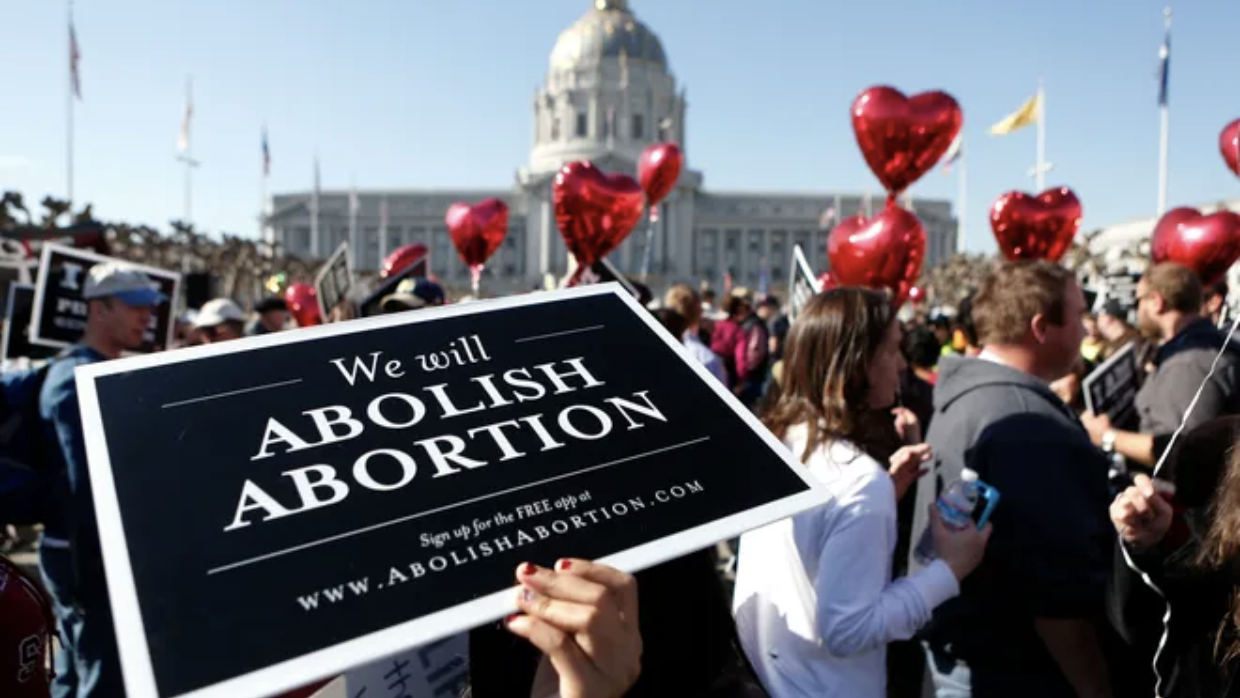Make America Mate Again: The Rise of Pronatalist Policies in the United States
Photo: Beck Diefenbach, AP
Argument by Nicole Doris | January 23, 2024
Ohio Governor Mike DeWine publicly stated that “the essential function of government is to protect the most vulnerable among us, those who don’t have a voice” while signing a law into effect that removed an 11-year-old-girl’s ability to abort her pregnancy. A pregnancy initiated by rape from a 26-year-old man. Obviously, such sweeping abortion laws don’t protect women targeted sexually or enduring life-threatening pregnancies, rather, they protect the unborn – those easiest to deem vulnerable.
Since the overturning of Roe v. Wade on June 22, 2022, similar laws have been put into effect across republication majority states. Such laws – mainly supported by Christian Republicans – have been defended on a moral basis, with many pro-life supporters sharing the same moral stance as DeWine. But are the recent sweeping abortion bans really stemming from a moral basis? Does this moral basis still stand when children are forced to carry the child of their rapist to term? No.
The Western world has been experiencing a distinct decrease in fertility levels in the last few years, with many reaching or below the replacement level of 2.1 babies per woman. The United States is no exception with “The Great Baby Bust” rising in popular concern as early as 2007. The country’s response to this possible threat has been a distinct rise in pronatalism – a political ideology that promotes the reproduction of human life and easily falls into a chasm of seeing women’s primary role as birth givers to boost a country’s native population.
A focus on the native population is what presents the most concern surrounding pronatalist policies. The Christian right has spearheaded a position of pronatalism with large family sizes deemed the will of God and a citizen’s duty to the nation. The problem with this form of pronatalism is not the fear that low birth rates will decimate the economy in the coming future – this is a very real possibility – but that fertility should no longer be a discussion of personal fulfillment, but rather cultural and political power. How can childrearing be shifted from an intimate decision to a dangerous ideology? By shifting the concern for the future of the children to the future of the correct children.
In one study published in late 2022, Americans that affirmed nationalist pronatalism statements overwhelmingly held patriarchal gender norms, Christian nationalist values, and believed that whites and Christians currently faced “the most discrimination.” It’s no surprise then, that women and non-white Americans will experience the worst effects of pronatalist policies. WASP (White Anglo-Saxon Protestants) nationalism is of rising concern as groups of far-right white individuals search for policies that will ensure the increase and protection of a white-dominated American population. They offer policies as large as mass deportation, instituting white-prioritizing racial quotas, and even absorbing 100% of the white population of South Africa – yes, really.
Charlie Kirk – a Republican talk show host – stated that declining birth rates are a problem because Americans are “going to have to supplement through cheap immigration.” Tucker Carlson – a former Fox News host – argues that Democrats will replace “real Americans” with immigrants in a term coined the “great replacement” theory. Such language even extends to the country’s former president – Donald Trump – as he stated “You have good genes. A lot of it’s about the genes, isn’t it, don’t you believe? The racehorse theory. You think we’re so different?” while addressing a primarily white crowd in Minnesota. To reiterate, the racehorse theory posits the idea that selective breeding can improve a horses, or in this case a country’s, performance.
So, is this rhetoric translating to policy? Yes – to an alarming degree. While forcing women to give birth via abortion bans may seem counterintuitive to increasing a white majority, it’s not. Banning abortion is an act of control over women’s bodies, especially those that are unable to leave the state to perform one legally or are unable to financially provide for future child. Furthermore, banning abortion is an attempt to ensure that those in poverty stay in poverty as contraception is not accessible and abortion was the most preventative step for many. Policies have also extended beyond fetuses to existing children. States, such as Florida, have adopted anti-inclusive policies aimed at policing the content in schools across the state. This follows the second initiative of pronatalism – to ensure that children are the right children with the right values regardless of parental beliefs.
Cases such as the 11-year-old in Ohio are just the beginning. It is imperative to go beyond asking whether her access to abortion would violate religious morals and begin asking whether that right was taken away after she was deemed a “delinquent” that brought the “non-forcible” rape upon herself – a consequence of being a nonwhite member of society.

